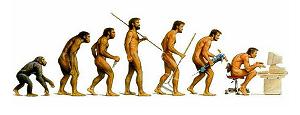
History of the modern scientific method
The ancient Greeks did not come up with a systematic way of studying nature, nor did they separate what we now know as science from other fields of study. Instead, they would sit under and olive tree with a bottle of wine and argue about the nature of the universe. As you would expect they didn't get very far. The ancient texts lumped all forms of knowledge together. A description of horses for example would contain drawings of horses, pictures of the insides of horses, stories about horses and ancient myths such as the half horse, half man creature. This activity slowed after the fall of Greece. It picked up again during the Renaissance. This is the 'rebirth' or 'rediscovery' of the ancient texts. After the Renaissance came the scientific revolution. The 'renaissance men' believed that all knowledge was to be gained by reading ancient texts. The scientists believed that new knowledge could be gained by making new observations. This led to a split between science and the arts. Just as science often appears to come up against religion, it has also come up against the arts. This is inevitable given the initial academic 'turf wars' that established the difference fields. However it continues to flare up every time one group tries to claim 'turf' that belongs to the other. An example is a scientist claiming to have authority on the ethics of cloning because he understands the mechanism. Stephen Jay Gould has written a lot about these 'false battles.' The new scientists began amassing vast volumes of observations, especially in what we now know as biology, but also in other fields. They also began coming up with new theories about the nature of the universe. Out of the scientific revolution emerged the modern scientific method. This is where we get the terms hypothesis, theory and law from. It can be summarised as follows:
1) Make observations All modern technology is based on knowledge gained through the modern scientific method. The modern scientific method gradually leads to more and more fundamental understanding of the nature of the universe. While it may seem frustratingly slow to those involved 'at the coalface,' in historical terms it has led to an explosion of new knowledge and technology. The reason science keeps going forward and discovering more is because the methods used prevent the scientific community being 'led down the garden path'. No bogus theories can get through. No theories can get through that will never be resolved by science. Provided of course that people stick to the modern scientific method. |
 Before the ancient Greek philosophers, there were people known as sophists. These were the teachers of the time, who passed on knowledge to the benefit of society. The well known Greek philosophers/scientists such as Aristotle replaced these teachers. In "Zen and the Art of Motorcycle Maintenance," Robert Pirsig describes this shift as a change from teaching what is good to teaching what is true. He blames this for a lot of the ills of modern society, although I think that has more to do with living in America.
Before the ancient Greek philosophers, there were people known as sophists. These were the teachers of the time, who passed on knowledge to the benefit of society. The well known Greek philosophers/scientists such as Aristotle replaced these teachers. In "Zen and the Art of Motorcycle Maintenance," Robert Pirsig describes this shift as a change from teaching what is good to teaching what is true. He blames this for a lot of the ills of modern society, although I think that has more to do with living in America.